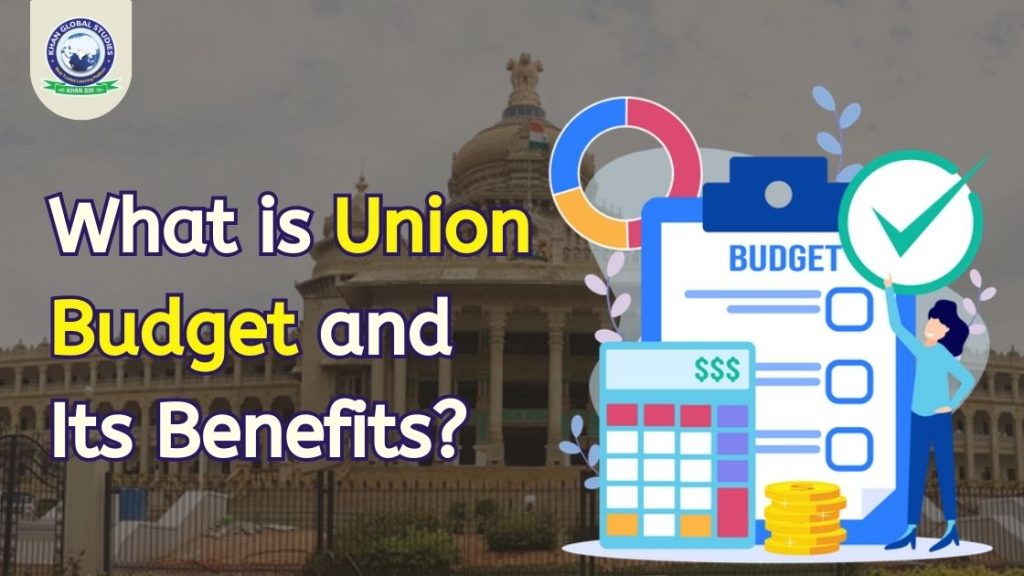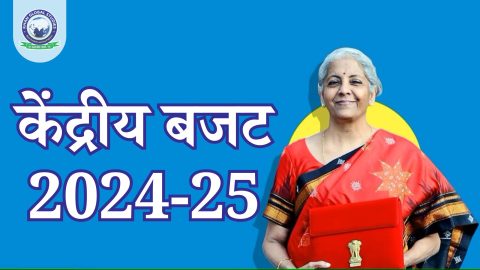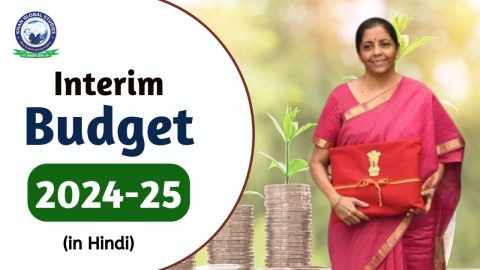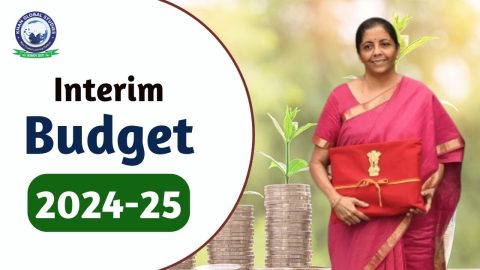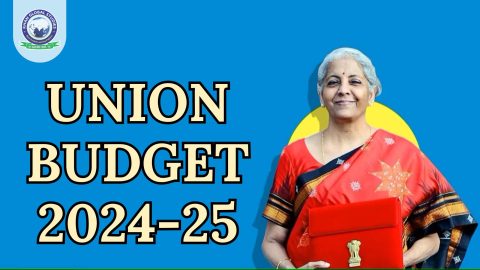According to Article 112 of the Indian Constitution, the Union Budget of each year in the country is called the Annual Financial Statement. The Union Budget accounts for the finances of the government for the financial year running from 1 April to 31 March. The Union Budget consists of two major components: the capital budget and the revenue budget.
About Union Budget
The Union Budget is the annual budget of India. It is generally presented by the Union Finance Minister on 1 February every year. Through the budget, the government presents the accounts of earnings and expenditures for the financial year. Every year in the country, from 1st April to 31st March next year is considered a financial year and the Union Budget is presented for this time. The Union Budget is divided into two parts (Capital Budget and Revenue Budget).
Capital Budget
The capital budget includes government payments. Loans from the government, foreign governments and the RBI form a major part of the government’s capital receipts. Capital expenditure is defined as expenditure on the development of machinery, equipment, buildings, health facilities, education etc. Fiscal deficit arises when the total expenditure of the government exceeds its total revenue.
Revenue Budget
The revenue budget includes those items which do not affect the assets of the government. The revenue budget gives details of the revenue and expenditure of the government. Tax revenue and non-tax revenue are two types of revenue receipts. When revenue expenditure exceeds revenue collection the government suffers a revenue deficit.
Interim Budget
The interim budget is a short-term measure covering the initial months of the financial year. It focuses on the income and expenditure of the government, allowing it to manage expenses after the elections until the new government takes charge. Finance Minister Nirmala Sitharaman will present the interim budget 2024-25 on February 1.
According to the information, the Interim Budget 2024-25 will be presented on 1 February 2024 at 11 am. The Budget 2024 session of Parliament is scheduled to begin in the last week of January and end in April. President Draupadi Murmu will officially open the budget session. On the first day, she will address both houses of Parliament.
The fiscal year ends on March 31, and the change of government occurs in late May or June, with the interim budget playing an important role in maintaining fiscal stability during the interim period. The budget session of Parliament is expected to begin on January 31.
What is the history of the Union Budget?
The word budget originates from the Middle English word “Boget”, which comes from the Middle French bouget meaning leather bag. The Indian budget is presented to the Parliament on a date fixed by the President. The budget speech of the Finance Minister generally consists of two parts. Part A deals with the general economic survey of the country while Part B deals with taxation proposals.
The budget in India was presented first time on 7 April 1860 from the East-India Company to the British Crown. The first Indian Budget was presented on 18 February 1869 by James Wilson. Wilson was the Finance Member of the Indian Council advising the Indian Viceroy. He was a Scottish businessman, economist, and Liberal politician. He founded The Economist and Standard Chartered Bank.
The post of Finance Minister was first given to Sir RK Shanmukham Chetty, industrialist, former Dewan of Cochin State and constitutional advisor to the Chamber of Princes. He was a member of the pro-British Justice Party. The first budget of independent India was presented by Chetty on November 26, 1947. However, only the country’s economy was reviewed in it.
Mathai gave the most candid budget speech in 1949–50 because he chose not to read all the details while telling the members. He then gave a short lecture on inflation and economic policy. This was the first budget of united India, as it contained the financial statements of the former princely states and where the biggest news was the formation of the Planning Commission and the need for five-year plans.
Why is the Union Budget presented?
The Union Budget outlines the government’s financial strategy, priorities and development plans. Tax reforms, infrastructure investment and social welfare allocation are at the center and the country’s economy is also assessed from this. Apart from this, the main objective of starting it is to eradicate poverty and try to meet the food, shelter, clothing, health care and education needs of the citizens and create employment opportunities.
When is the Union Budget presented?
The Union Budget has been presented on the first day of February for many years, but earlier the presentation of the Budget was around 28 February (or 29 February in leap years). Let the candidates know that earlier the Railway Minister used to present the Railway Budget in Parliament a day before the General Budget, but in the first term of the BJP government, the then Finance Minister Arun Jaitley had ended the 92-year-old practice. In 2017, the Railway Budget started being announced in the General Budget itself. The first railway budget of India was presented in 1924 during British rule and the first railway budget of independent India was presented by John Mathai in November 1947.
Who presents the Union Budget?
The Union Budget is presented in the Parliament by the Finance Minister of India on the first day of February every year. Union Finance Minister Nirmala Sitharaman will present the interim budget for the financial year 2024-25 on 1 February 2024.
How is the Union Budget presented?
- The Finance Ministry issues circulars to all ministries, states, union territories and autonomous bodies at the initial stage of the budget-making process. These circulars are made by ministries to express their needs and demands.
- Apart from presenting estimates, these ministries also give information about their earnings and expenses for the last year. Later top government officials evaluate them and discuss them with ministries and the Department of Expenditure.
- After the information is verified, the Finance Ministry allocates revenue to various divisions. In case of any disagreement on the distribution of funds, the Finance Ministry consults the Union Cabinet or the Prime Minister.
- The Finance Ministry also holds pre-budget meetings. After considering all the requests, they are discussed with the Prime Minister.
- It is an annual tradition of the government to organize the Halwa ceremony a few days before the budget announcement. This function marks the beginning of budget document printing.
- Presenting the budget in Parliament is the final stage of the budget-making process. The Finance Minister conducts the presentation on the first day of the budget session. After the presentation, the budget is placed before both Houses of Parliament for discussion. After approval from both houses, the budget is sent to the President.
- The budget speech of the Finance Minister in India usually consists of two parts. Part ‘A’ deals with the general economic survey of the country while Part ‘B’ deals with taxation proposals.
- Earlier the General Budget was presented at 5 pm on the last working day of February, but since 1999 the General Budget is being presented at 11 am on the last working day of February.
- The General Budget is presented in the Lok Sabha by the Finance Minister. He gives a speech while presenting the budget and only in the last part of his speech does he talk about his proposals for new taxation or changes in existing taxes.
- The ‘Annual Financial Statement’ is laid on the Table of the Rajya Sabha at the end of the Finance Minister’s speech in the Lok Sabha.
- Along with the annual financial statements, the government presents documents explaining the nature of receipts and expenditures during the current year and the next year.
- After the vote on the account is presented, the discussion on the budget begins. In a democratic system, the government is keen to give full opportunity to the Parliament to discuss various proposals on budgetary provisions and taxation.
- The vote on account is taken for two months, but if in an election year, or when it is anticipated that it will take more than two months to pass the main grant and appropriation bills, the vote on account is taken. More than two months. can be taken.
- The budget is discussed in two stages in the Lok Sabha. First of all, there is a general discussion on the full budget and it lasts for 4 to 5 days. In this stage, the broad outline of the budget and its principles and policies are discussed.
- Let the candidates know that Finance Minister Nirmala Sitharaman has presented the country’s first paperless budget. Let us tell you that due to the Covid crisis, changes were made in presenting the budget 2021 and this was the first paperless budget of the country. After this, the budget for 2022 and 2023 was also paperless.
- The use of briefcases for carrying budget-related documents was also stopped and now Finance Minister Nirmala Sitharaman is seen carrying budget-related documents in a bag that looks like a ledger.
What is the importance of the Union Budget?
The importance of the Union Budget is as follows:
- A budget helps create financial stability.
- Creating a budget is important to keep track of expenses and follow plans.
- Budgeting keeps a person in a stronger financial position both day-to-day and in the long term.
- To make proper allocation of resources in the country.
- To reduce unemployment and poverty.
- Addressing wealth inequalities.
- Controlling prices and shaping the tax structure.
- The Union Budget dictates changes in direct and indirect taxes and also includes changes in income tax rates and tax brackets.
Interesting Facts about the Union Budget
Interesting facts about the Union Budget are as follows:
- The first Indian budget was presented over 160 years ago in 1860 by a Scottish economist named James Wilson.
- The first Indian budget after independence was presented on 26 November 1947 by the then Finance Minister RK Shanmukham Chetty.
- The first budget of India contained a basic overview of India’s economy and did not make any changes or proposals.
- There is an Indian tradition of eating something sweet before starting any good work. This tradition is followed in the case of budget presentations. The ‘Halwa’ ceremony is organized in the Finance Ministry 10 days before the presentation of the budget.
- Many of you may not know this, but Professor Prashant Chandra Mahalanobis was the man behind the Union Budget concept.
- PC Mahalanobis, considered the father of modern statistics in India, was influential in designing the budget of independent India.
- Although the Finance Minister is entrusted with the task of presenting the Budget every year, there are also instances when the Prime Minister has taken up this responsibility.
- Pandit Jawaharlal Lal Nehru was the first Prime Minister to present a budget in 1958 when Finance Minister TT Krishnamachari resigned.
- In 1970, the then Prime Minister Indira Gandhi presented the budget when Finance Minister Morarji Desai resigned.
- Similarly, in 1987-88, the then Prime Minister Rajiv Gandhi presented the budget when Finance Minister VP Singh had resigned.
- Morarji Desai has the record of presenting the highest budget during his tenure. He presented a total of 10 budgets.
- P. Chidambaram and Pranab Mukherjee presented the budget for the 9th and 8th time.


